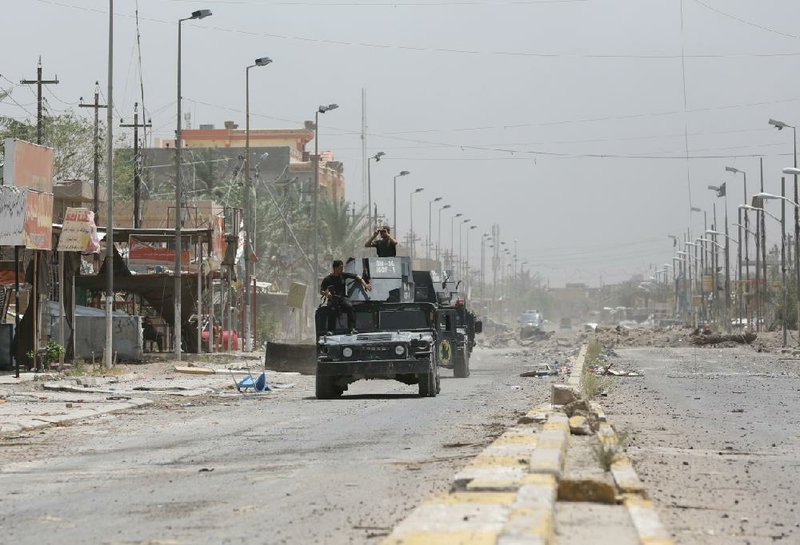FALLUJAH, Iraq -- Dozens of homes were looted and burned as Fallujah was liberated from the Islamic State militant group, and Iraqi government forces Monday accused the retreating militants. Some provincial police, however, blamed the fires on Shiite militias operating with the federal police.
The allegations of sectarian clashes in Fallujah are on a much smaller scale than those that unfolded in Tikrit, another Sunni-majority city, after government-sanctioned Shiite militias helped retake it from the Islamic State. The Iraqi government had attempted to prevent similar abuses in the Fallujah campaign.
Iraqi forces declared Sunday that they had "fully liberated" Fallujah from the Sunni-led extremist group that took over the city 40 miles west of Baghdad more than two years ago. The operation, backed by airstrikes from a U.S.-led coalition, began May 22 and involved several different Iraqi security forces: elite special operations troops, federal police, Anbar provincial police, and an umbrella group of government-approved, mostly Shiite militias.
Thick clouds of black smoke billowed over a neighborhood in northwestern Fallujah, one of the last strongholds of the militants, from dozens of burning homes.
Special forces Lt. Gen. Abdul Wahab al-Saadi, who led the operation to retake the city, said Islamic State militants had torched hundreds of houses in Fallujah's north and west as they fled Sunday, just as the fighters did in many other neighborhoods over the past five weeks.
But some commanders said many of the fires burning Monday were lit by Shiite militiamen operating with the federal police.
Cpl. Arsan Majid, an Anbar provincial policeman, said he saw men in federal police uniforms looting and burning dozens of homes. An Iraqi special forces soldier, speaking on condition of anonymity because he was not authorized to brief reporters, confirmed Majid's account.
The Shiite militias largely had remained on Fallujah's outskirts during the operation while the special forces and federal police took the lead in clearing the center of the city. Fearing sectarian conflict, authorities did not want the militias inside the city that has long been a stronghold of Sunni opposition to the Shiite-led government in Baghdad.
However, small numbers of militia fighters entered the center of the city with Iraq's federal police forces, according to Iraqi commanders and reporters at the scene.
Standing under a highway overpass Monday, a group of Iraqi troops argued over the cause of the smoke.
"It's impossible to know who lit those fires," one man said. He pointed down a street of opulent homes used by the militants as bases -- all marked with Islamic State graffiti and all charred by flames from the inside out.
In one home, melted curtains still hung in the windows and bright periwinkle paint decorating the sitting room had blistered from the heat.
"Daesh did it, just like they did here," he said, using the Arabic acronym to refer to the Islamic State.
Majid of the Anbar police initially nodded his agreement in front of the group, but later he whispered to a reporter that Shiite militias operating with the federal police were to blame.
"They destroyed 50 homes in a single day," he said out of earshot of the group of Iraqi army officers.
Special forces Cpl. Mohammad Hussein, stationed at a makeshift base in the city center, said his men arrested about six people who were caught looting.
"They were just taking whatever they could find," he said.
On the side of the road, a group of federal police gathered to slaughter a dozen sheep in celebration of Sunday's victory.
Standing above a pile of sheep carcasses, police officer Arkan Saker shrugged off allegations that his forces were to blame for the fires burning on the far edge of the city.
"It's just people burning garbage," he said, "or it could be from a house booby-trapped with explosives."
The U.N. estimates 85,000 people have fled Fallujah in the past month, and many are sheltering in hot, overcrowded camps in the middle of the desert as the Iraqi government is ill-prepared to deal with the humanitarian crisis. The people living out in the open face midday temperatures that approach 120 Fahrenheit.
Government spokesman Saad al-Hadithi said an emergency allocation of another $8.5 million in aid was approved earlier this month.
"Given the high population density inside the city, we prepared four camps before the operation," al-Hadithi said. "But the large number of displaced people and the quick movement has made it very hard to meet their needs."
U.S. State Department spokesman Elizabeth Trudeau said Washington "remained concerned about the humanitarian situation for Iraqis fleeing the fighting."
"However, we have seen significant progress by the U.N. and Iraqis in recent days to provide for the basic necessities of internally displaced persons," she said.
Majid, who also fought in Ramadi, said Fallujah was left in better shape, but acknowledged that the damage was still significant.
"Imagine the people who will return here just to find their home burned," Majid said. "They will have to go back to the camps. It's terrible."
Elsewhere Monday, Iraqi officials said a suicide bomber targeting a Sunni mosque west of Baghdad killed 14 and wounded 32.
The evening attack targeted an Abu Ghraib mosque as worshippers gathered to pray after breaking their fast during the holy month of Ramadan.
Police and hospital officials confirmed the tolls and spoke on condition of anonymity, as they were not allowed to release information.
No group had claimed responsibility for the attack as of Monday night.
Information for this article was contributed by Matthew Lee, Sinan Salaheddin and Qassim Abdul-Zahra of The Associated Press.
A Section on 06/28/2016

